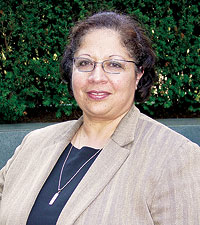Rare Cancers Draw Little Attention
By Jo Lynn Orr
 Isis MikhallHow rare are rare diseases? The official verdicts come from the Orphan Drug Act and the Rare Disease Act of 2002: A rare disease or condition, according to United States law, is one that affects less than 200,000 people-or one that affects a greater number of people, but the costs of developing and distributing a drug to treat it won't be recovered from future sales.
Isis MikhallHow rare are rare diseases? The official verdicts come from the Orphan Drug Act and the Rare Disease Act of 2002: A rare disease or condition, according to United States law, is one that affects less than 200,000 people-or one that affects a greater number of people, but the costs of developing and distributing a drug to treat it won't be recovered from future sales.
In her work at the National Cancer Institute (NCI), UAB alumna Isis S. Mikhail, M.D., M.P.H., Dr.P.H., can attest to another definition: A rare disease is one that stumps the average physician. As program director of the NCI's Clinical and Translational Epidemiology Branch, Mikhail works in the area of rare cancers—those with an incidence of less than 15 per 100,000 or fewer than 40,000 cases per year. She receives numerous inquiries from foundations, patients, and patient advocates for information about research on uncommon cancers. "I've heard from many family members of patients with rare cancers," she says. "But almost all of those requesting information have voiced the same complaint: Physicians have little knowledge of rare cancers and the treatments available to patients grappling with these diseases."
Rare Opportunity
Mikhail, who began working with the NCI's Epidemiological and Genetics Research Program in 2003 after completing her doctorate in public health at UAB, says another frequent request is for more research to target rare cancers. Based on those inquiries, she and her team conducted an analysis of NCI funding and found that most researchers target the big cancers—breast, colon, prostate, and lung. "In order to focus more attention on rare cancers," she says, "I contacted CARRA (Consumer Advocates in Research and Related Activities), which is a liaison between NCI and consumers, and the National Institutes of Health's Office of Rare Diseases, which cosponsored a meeting in May 2007 on rare cancers that I helped organize." The meeting was very successful, Mikhail says; it featured comments from a survivor of a rare cancer called carcinoid syndrome.
Although rare cancers strike a small percentage of the overall U.S. population, they can have a large impact. The total cancer incidence from all rare tumors is substantial, and rates of some, such as esophageal cancer, have risen steadily over the past several years. "Some rare cancers are highly lethal," Mikhail says, "and those that occur at a young age result in significantly lessened life spans."
Beyond the Numbers
Studying the causes and origins of rare cancers could improve understanding of all types of cancers, Mikhail believes. "Some rare tumors—retinoblastoma and angiosarcoma, for example—tend to have a simpler etiology, which if understood might provide insight into the etiology of common, more complex cancers," she says. Family studies have shown that some rare cancers tend to be heritable and might shed light on genetic mechanisms that act as triggers. In addition, Mikhail says, a first study of a rare tumor is more likely to provide researchers with useful results than yet another study of a common and complex tumor that has so far proven intractable.
At last year's NCI workshop, participants addressed the question of how best to study rare cancer etiology. "Several methods were proposed," Mikhail says, including taking advantage of existing data, patient cohorts, and clinical trials, and starting new studies to address specific hypotheses. All of those options, she notes, depend on building partnerships among researchers and a supportive infrastructure for collaboration. "Workshop participants proposed that NCI foster new collaborations and that it explore the feasibility of using the NCI-designated Comprehensive Cancer Centers to facilitate such partnerships," Mikhail says.
In addition to the medical need, there are ethical reasons for studying rare cancers, she adds. "Patients who have rare cancers should not be left to carry the burden of their diseases alone. They should be allowed some hope of a future cure."